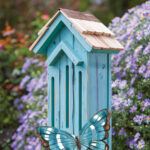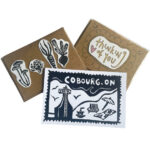
Dee Fryer came from Chaguanas, Trinidad to Campbellford with her flavour memories and traditional recipes stowed away. It took a pandemic and a dare to get her cooking.
Watershed Magazine: Your restaurant is called D’s Modern Caribbean, but Caribbean is a bit of a catchall term. What makes Trinidadian cuisine different from, say, Jamaican?
Dee Fryer: When customers come in, the first thing they say is “Do you have jerk?” because they are most likely thinking about Jamaican jerk. We have Trinidadian jerk. But our spicing and cooking processes are different. Trinidadian cuisine is influenced by many cultures. Yes, it’s a Caribbean country, but many years ago, folks from India came over and they brought their cooking traditions, but they couldn’t get certain ingredients, so they made do with what was available, creating a fusion of flavours. Trinidad is populated by East Indian, Spanish, Chinese, African, and Indigenous Carib people. My grandpa was Carib and East Indian, and my grandma was Spanish and East Indian, so I have everything in me and that shows in my food.
You started out with a food truck, now you have a café; tell us about your journey.
And what a journey it’s been! It took three years. I opened the truck in 2021, and I parked by the old firehall in Campbellford. Having the truck was one of the most rewarding experiences of my life. My best friend was with me on the truck and we had a blast: the lineups, the summer weather, we were outside, but after the first season my customers kept saying they needed my food in the winter too, so I sold the truck and opened a take-out shop. But then people started asking about sitting down. I didn’t want to be like other Caribbean places, with just a few tables and chairs – good food, but no décor, no ambience. Being an interior designer, I said I’m not going to do that. So I opened the café.
Where did you learn to cook?
I grew up in Trinidad and my parents were excellent cooks. I remember Saturday mornings, my dad and I would get up at four in the morning. We’d drive to the bay as the fishermen were coming in and we’d buy the freshest shrimp and crab. When we got home, I would help with the shelling. It’s just always been food. That’s probably why I’m not skinny! But you know what they say: “never trust a skinny chef!”
Tell us about your cooking style.
I want my café to stand out as a place that offers unique Caribbean food. I like to do specials and signature dishes. This summer I’m cooking up a lobster roti in a subtle coconut sauce, with our gently curried potatoes, wrapped in a soft, buttery paratha with a side of microgreens from a local organic grower, Leigh’s Homegrown Greens out of Castleton.
Goat features on your menu. How have your diners reacted to it?
Goat is one of our top sellers. Our goat burger is our top overall seller. I choose the cuts and have my butcher make the best mince with just the right amount of fat – goat is lean – then I season it with the tastiest Trinidadian spices and herbs, and top it with brûléed pineapple.
What would you say to someone who’s never eaten outside their comfort zone? Do you promise not to burn their tongue?
Our food is very flavourful. I don’t cook with heat, I cook with flavour: pimentos, chadon beni, coconut, thyme, saffron and turmeric.
The space is lovely in dark warm greys with hits of gold, green, mustard and sparkling crystal. On the walls are paintings depicting scenes of Trinidadian village life; do they have a story?
Yes! Two of them were given to me by Harold Hosein of CityTV. He’s retired and lives in Roseneath and he loves my food. He’s also Trinidadian, and he came in one time and said, “You represent Trinidad so well, I want you to have them.”
Tell us about your bar menu; what is the national drink of Trinidad?
Rum is our thing – because: sugarcane. I only carry the best: Angostura 1824. We make an amazing piña colada with fresh coconut water and cream. I’m keeping it authentic, serving only Caribbean beer – but I do have some excellent wines.
Story by:
Signe Langford




